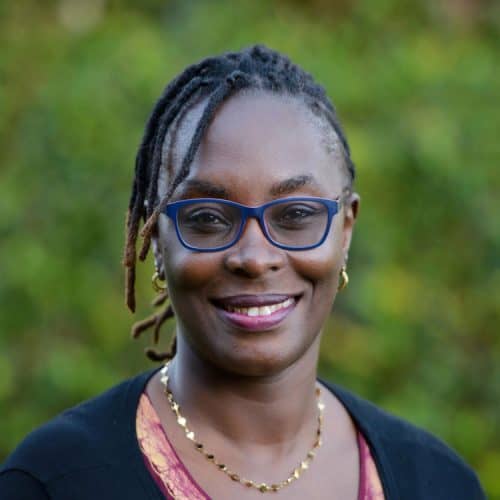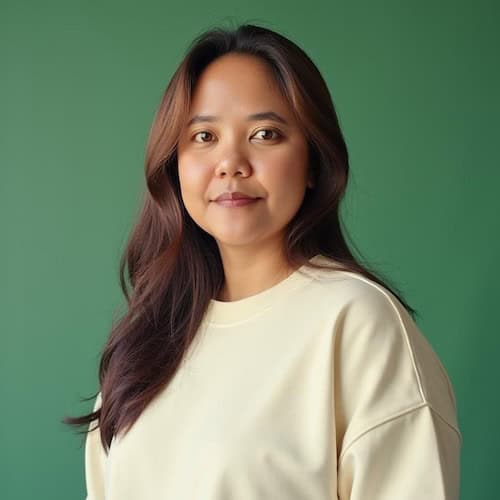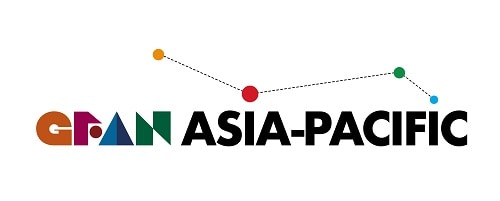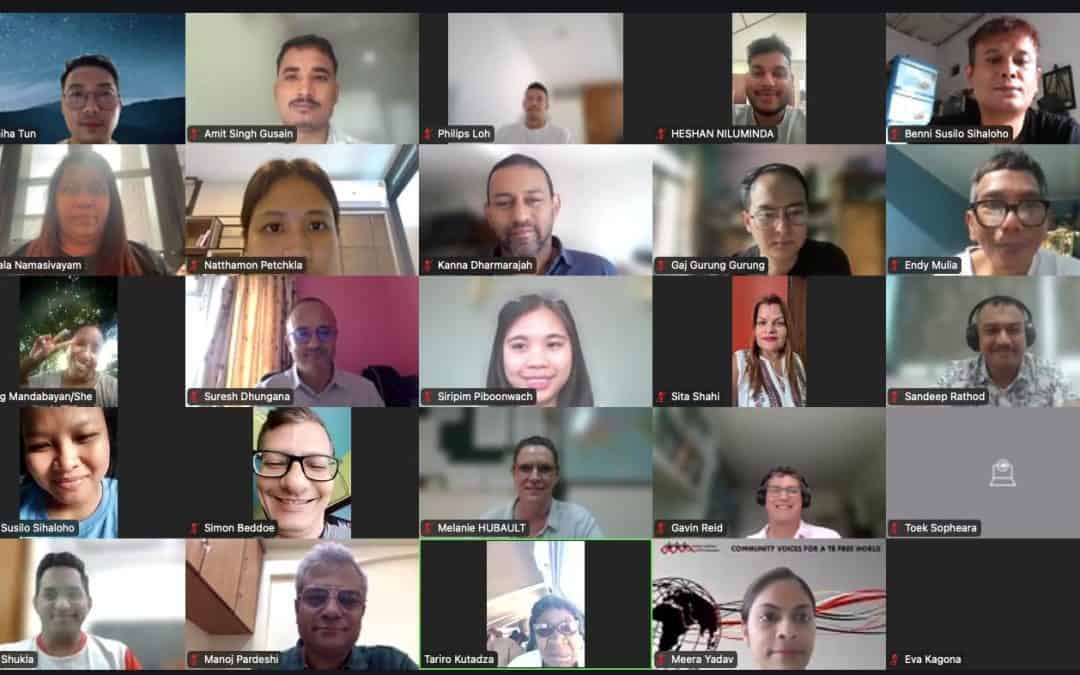On 29 May 2025, Global Fund Advocates Network Asia-Pacific (GFAN AP), Seven Alliance and the Asia Pacific Regional Learning Hub (APRLH) jointly organised a webinar call to debrief, share updates, and engage in coordination and discussions around the recent 53rd Board Meeting of the Global Fund to Fight AIDS, Tuberculosis and Malaria (Global Fund) earlier this month.
The webinar aimed to strengthen the understanding of Asia-Pacific communities and civil society on the deliberations and inputs from the Communities, Developing Country NGO and Developed Country NGO Delegations to the Board of the Global Fund; as well as provide Asia-Pacific communities and civil society understanding of the positions on Global Fund governance issues.
The webinar was attended by around 160 community and civil society representatives and was moderated by Jennifer Ho (Operations and Programmes Manager, GFAN AP). The webinar was conducted in English, with simultaneous interpretation provided in Hindi and Bahasa Indonesia. Welcome remarks were delivered by Rachel Ong (Regional Coordinator, GFAN AP) and Chinmy Kumar (Coordinator, APRLH) on behalf of the co-organisers.
Rachel Ong began the debrief by providing a brief overview of key discussions at the 53rd Board Meeting:
- There will be no further board meetings this year, with the next meeting scheduled for February 2026.
- One of the three main decision points reached during the meeting is an amendment to the Terms of Reference (TORs) for the Technical Review Panel (TRP) members, given various changes in grant cycle reprogramming.
- The Global Fund Secretariat (GFS) is undergoing some restructuring alongside cost control and budgetary reviews.
- Donors continue to express strong support for the Global Fund, with a focus on working more effectively and as a leaner organisation.
- A number of conversations during Day 2 centred on ensuring that revisions to Grant Cycle (GC) 7 and 8 do not neglect the meaningful and effective participation of communities and civil society in GC processes, as well as pushing for earlier and increased pledges to meet the US$18 billion Eighth Replenishment target.
- Some donors also expressed sentiments that the Global Fund remain performance-based, as well as that countries be more self-reliant and self-sustainable.
Rachel also shared a link to the Global Fund Board Meeting documents.
1. Position from Communities Delegation and Key Concerns | Maurine Murenga (Constituency Focal Point, Communities Delegation)
Maurine Murenga presented on the position and key concerns of the Communities Delegation:
- Prior to the 53rd Board Meeting, the Communities Delegation submitted a paper on direct funding for key and criminalised populations, which was positively accepted. In the context of countries transitioning to domestic resourcing, the paper proposes a mechanism for making direct funding available to criminalised populations who may not be considered as existing populations and become unable to access services. A positive outcome from conversations during the Board Meeting is an indication from GFS’s Executive Director that the mechanism could be considered for GC8.
- A key concern is the lack of significant investments by the Global Fund in human rights and gender, and the poor key performance indicators (KPIs) on human rights and gender that were reported, with none of them reaching the 50% mark. This calls for us to reflect on ways to improve the processes and collaborations with country teams to ensure human rights and gender programmes are effective, reach the right people, and well supported by partners.
- A key concern around the reprioritisation of GC7 grants is the unequal level of community engagement in country coordinating mechanisms (CCM) in some countries. The Communities Delegation is working with GFS to improve the engagement of communities in CCMs and ensure equal and active representation.
- A key concern around GC8 is the possible eventuality of a smaller replenishment and its impact on programmes and constituents in GC8. Therefore, it is important that constituents and communities advocate for resource mobilisation, including domestic resources for health, and be involved in budget-making processes.
- There is also a concern with GC8 around the possibility of a heavily commoditised Global Fund where much of the resources go towards commodities, with reduced investments that support communities’ access to these commodities. It is important that we protect the gains made in addressing barriers to access in terms of building resilient and sustainable systems for health (RSSH). We are still not doing enough on the component of community systems strengthening (CSS). Community-led monitoring (CLM) must be prioritised to enable monitoring and accountability to ensure communities are receiving services.
- While the Risk Management Report reflected current challenges well, Communities Delegation would have appreciated a higher alert on growing anti-rights movements which has threatened access to services, particularly for key populations. The hope is that future risk reports would highlight the impact of anti-rights movements on the Global Fund’s policies and goals.
2. Position from Developed Country NGO Delegation and Key Concerns | Ikka Noviyanti (Member, Developing Country NGO Delegation)
Ikka Noviyanti presented on the position and key concerns from Developing Country NGO Delegation (DCNGO):
- The 53rd Board Meeting was unprecedented, covering not only the reprioritisation of GC7 mid-cycle but also the preparation for GC8 beginning next year.
- The intersecting crisis we are facing has placed immense strain on health systems and the continuity of essential HIV, TB and malaria services, with marginalised and criminalised communities bearing the heaviest burdens.
- During the Board Meeting, the Board approved revisions to the TRP to focus its engagement on high-impact and core portfolios as well as transitioning countries, while allowing flexible processes for others.
- The DCNGO Delegation insisted that the TRP continue its critical role in raising the alarm around power imbalances, human rights, gender inequalities, shrinking civic space in many countries that marginalise civil society and communities. This independent oversight must remain despite differentiation in grants. As a non-negotiable, the TRP must continue to track the gender equality marker in addition to community, rights and gender components.
- For the review modality, all high-impact and core portfolios will be reviewed except for those under programme continuation and the review approach will be applicable, if certain criteria are met, in which case they will not review or will follow a target review or cost extension. Focused portfolios will not be reviewed by the TRP, however, the TRP review can be requested by the CCM and the secretariat in consultation with relevant technical partners.
- On the TRP membership, terms of current members for GC7 will be extended until the end of 2028 and all GC7 non-serving and reserve list members will be onboarded for a six-year term, with a mid-term review after three years.
- The TRP review criteria is changed to include language on digital security and climate change, and differentiated application for review criteria is encouraged, where appropriate.
- Regarding the reprioritisation of GC7, there remains uncertainty surrounding the Global Fund partnership’s ability to fully deliver on its strategy amidst constrained resources and potential programmatic limitations.
- The DCNGO Delegation emphasises the Global Fund’s vital role in advancing global health security through investments in pandemic preparedness, RSSH and community-led responses, and accountability measures to ensure civil society and community engagement.
- Looking ahead of GC8, the Delegation reiterates that efficiency and sustainability must not come at the expense of justice, human rights, gender equality, and civil society. If we oversimplify the grant making process, we risk removing the very element that makes the Global Fund unique, which is country ownership, inclusive governance, and community-led action.
- The DCNGO Delegation supports calls from the Community Delegation for mechanisms that directly resource community-led responses in a more sustained and flexible manner.
- Recognising that the Global Fund is currently operating above the defined risk appetite with many factors beyond its control, ongoing collaboration with the Office of the Inspector General (OIG) is key to guide the response and inform necessary adaptations to align risk management with the mission. Engagement with the Global Fund Board, civil society, and communities are important in advancing the Eighth Replenishment and maintaining programme support.
- The DCNGO Delegation is glad to see acknowledgement of the need to improve accountability for civil society engagement. The GFS has committed to strengthening communication with CCMs to provide targeted support in countries where civil society engagement is weak, enhancing monitoring, and also working with Community, Rights and Gender (CRG) and regional platforms to track whether the countries are actually following through on these promises.
3. Position from Developed Country NGO Delegation and Key Concerns | Vitaly Djuma (Board Member, Developed Country NGO Delegation)
Vitaly Djuma presented on the position and key concerns from the Developed Country NGO Delegation (DevDel):
- The main concern from DevDel during this volatile time is ensuring that the Global Fund partnership implements and achieves its strategy while keeping civil society and communities meaningfully engaged in reprioritisation processes.
- While DevDel approved the decision on the amended terms of reference for the TRP, they mentioned a concern around the diminished role of the TRP in future grant making, negotiation, and approval processes, which may need to be further deliberated.
- DevDel emphasises the role of CRG programming in countries and cautioned against the Global Fund becoming overly focused on procurement of commodities without also putting communities at the centre of the partnership.
- DevDel emphasises that catalytic investments (CI) must remain in place regardless of replenishment outcome to support important human rights programming that support criminalised and marginalised communities, especially with such programmes potentially at risk as a result of GC7 reprioritisation.
- DevDel recommends that the risk status for donor funding in the Risk Management Report and Chief Risk Officer’s Annual Opinion, currently listed as “high”, be reassessed as “very high”, with changes to actions and strategies taken by the GFS reflected accordingly.
Vitaly also shared a link to a DevDel Brief on Key Takeaways from the 53rd Board Meeting.
4. Questions & Answers
Chinmy Kumar moderated the questions and answers segment.
Daniel Marguari (Spiritia Foundation) emphasised that it is important that NGO representatives engaged at the country level be aware of progress on the Eighth Replenishment and are actively involved in strategies to mobilise domestic resources, engage with CCMs, and collaborate with regional and global partners to support advocacy on pledges from governments and the private sector.
Sonal Mehta (ECHO India) asked if there were any discussions around changes to grant-making strategies as well as environment and climate change.
Vitaly responded that there are ongoing discussions to evolve the way the Global Fund is working, including changes to funding envelopes, to decrease the level of bureaucracy. One potential way that is spearheaded by the Communities Delegation and supported by DevDel is direct funding to communities. Climate, which has been discussed during previous meetings, was not discussed at this recent Board Meeting which was focused on the current funding situation.
Lizzy Igbine (Nigerian Women Agro Allied Farmers Association) asked how their organisation could formally engage with the Global Fund to access funding for communities on agriculture and nutrition.
Aditia Taslim (International Network of People Who Use Drugs) reflected on the risk of key populations being left behind and emphasised the importance of strategising collectively and pushing to be heard during the short window period for engagement in the GC7 reprioritisation process. Aditia also asked if there had been any successes at the country level in accessing funds for communities from CCMs.
Vitaly responded that now is an important opportunity for communities and civil society to be involved and influence processes around GC7 reprioritisation, by getting in touch with CCM members and ensuring information from the Global Fund is distributed to wider civil society within countries. Speaking as a civil society activist, Vitaly shared that some CCMs have formalised support to community participation in GC7 reprioritisation, and the Global Fund has issued an instruction for available funds to support communities and civil society involvement. Vitaly also explained a few ways communities and NGOs can be involved in Global Fund processes: (1) through the Developing Country NGO Delegation to be involved in Board processes; and (2) through the CCM for country funding request negotiations.
Manoj Pardeshi (National Coalition of PLHIV in India) asked if there has been any discussion or decision on mechanisms, such as regional networks, which would provide direct access to funding for communities.
Vitaly responded that the paper produced by the Communities Delegation is a proposal for direct access for communities in general, though it is not a description of mechanism. Regarding direct access to communities on CCMs, there has not been much discussion yet.
5. Closing
Jennifer concluded the webinar with acknowledgement and appreciation to speakers and participants for the many questions and robust engagement, while noting GFAN AP’s upcoming webinar on GC7 reprioritisation taking place soon. Chinmy and Rachel delivered the closing remarks, expressing appreciation to all participants and emphasising the importance of continued conversations between partners from various regions and delegations during this challenging time for all.
SPEAKERS:




